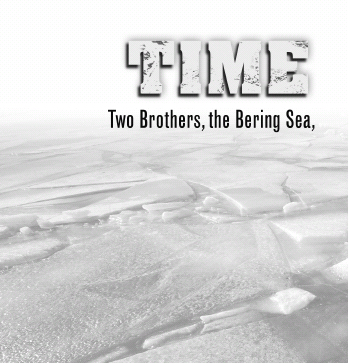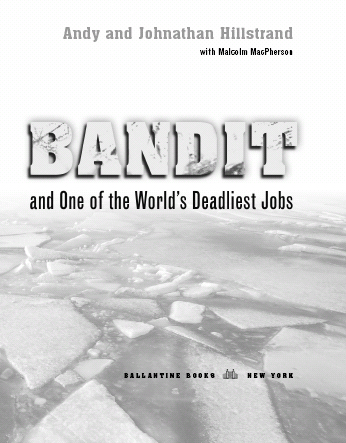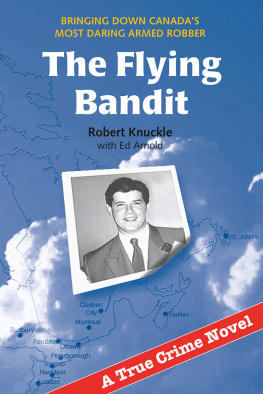


Contents
For Dad. We miss you.
To my wife, Sabrina, thanks for sticking with me through thick and thin for twenty-six years. I love you. To my daughters, Chelsey and Cassie, you make me proud to be your dad. To the rest of my family, thanks for the great memories.
Andy
To our grandmother, Jo, and our mother, Joan, (along with our stepfather, Bob, and all the other people I am so blessed to have in my life), for your love and for helping me to raise my son, Scotty, all the times I was gone.
Johnathan

I Live Like a King
Johnathan
I am a fisherman, an Alaskan fisherman, and a Bering Sea crab fisherman with thirty-seven years on commercial boats. I am tagged as a bad boy of the Bering Sea in the deadliest profession in America. I have fought forty-foot seas and seen rogue waves one hundred feet high. I work on water cold enough to kill a man in five minutes, and I have bent under the power of 120-knot Williwaw winds and watched the crushing strength of the Arctic ice pack move south from Russia around the hull of my boat, Time Bandit. I am Johnathan Hillstrand and that is where I stand in the universe.
Right now, that might be another mans life, because I am drifting in a small boat without power, alone, and with no help in sight. Waves no taller than my forearm lap the hull with a rhythm that makes me want to dream. Nothing here threatens me. The sky is a washed-out blue without a cloud to the horizon in every direction.
Its creeping me out.
The boat I am on, a thirty-eight-foot Weggley gill-netter I named fishing vessel (F/V) Fishing Fever, bobs with the tide in full ebb at about four knots. The boat and I are captives of a moon that pulls us southwestward. I am, I can only estimate, fifty to sixty miles southwest of the mouth of the Kasilof River where I started this morning. I have about ten dozen fat, fresh, Cook Inlet, red sockeye salmon on ice in my tanks. I care where the tide is drifting me (not just because going where I do not want to go is an inconvenience); I would prefer to be back at fishing camp by nightfall with my buddies in the junkyard behind the Kasilof cannery with a bottle of Crown Royal in one hand and a hot dog in the other, telling stories around an oil-drum fire. Almost certainly, that will not happen.
I started drifting when Fishing Fevers engine blew up more than three hours ago. The reduction gear fried with a grunt, and the boat shuddered and died like it had been sapped. The demise did not come as a complete surprise. The boats former owner never changed the oil, and the engine was flooded twice. I bought the boat four years ago because I liked the shape of its hull, not the thrum of its engine. The blame is also mine. I had gunned the engine at stressful rpms back and forth along the hundred-yard length of the gill net in an attempt to herd the spawning salmon toward the mesh. I cannot make repairs to the reduction gear until I can get back to Kasilof, lay the boat on the mud, and get a mechanic in the tiny engine compartment with wrenches. I opened up the cover and squeezed myselfI am 6 1 and weigh 205 poundsbehind the drive shaft for a look. The shaft is not spinning, and clear oil leaks in the reduction gear when I turn the engine off. Murphys Law works on water as well as on land. My batteries are not charging. I am leaking power slowly. With batteries fading, no motor, no radios, I am, in a word, fucked.
I shut the cover, wishing I could forget what I saw.
The tide is drifting me faster than I like in the direction of Augustine Island and beyond, into the Shelikof Strait, where anything can happen, and sometimes does. In his ships log, Captain Cook supposedly wrote that the second worst weather and currents on earth, after Cape Horn, can be found in the Strait. Like the Bering Sea where my brother and I fish, storms come up in the Strait with startling speed and a violence that can turn a pond into a maelstrom in six hours, and often less. The winds whip off the icy fjord walls that overlook the Strait; currents from the Kennedy Entrance compete with currents from the Cook Inlet, Kachemak Bay, the Gulf of Alaska, and several tidal rips. Put together, these produce swells like nowhere else in Alaska. I look at my watch. As we say, shit happens when you party naked.
It was not long ago that I was caught in the Strait. It was blowing eighty. I looked out and shouted into an indifferent and wild wind. I was coming in to shelter in a cove when I saw a man on the water in what looked like a canoe. He was waving a red coat. I did not believe my eyes. My deckhand and friend, Codfish Tom, woke up and looked to verify the sight. Codfish is a big dude with a head big enough to have its own gravity, its own atmosphere, its own weather system. I asked him, Do you see that, Codfish?
He said, It doesnt make sense.
Three guys were sitting on the bottom of a boat no bigger than Fishing Fever; the storm had capsized their craft with only the bow sticking out. The men were dying slowly of hypothermia, bleeding out body warmth twenty-four times faster than they would in air the same temperature as the water. A bitter cold was reaching its icy fingers into the core of their hearts. They had no survival suits. I jumped into the water in my survival suit to save them. They had no strength when I reached them. One of them sank. He just gave up and headed to the bottom. I grabbed him by the hair and pulled him up for breath. One by one I brought them onboard my boat and gave them hot coffee and cigarettes and dry clothes. I quickly flipped through the pages in a book for advice on treating hypothermia, where I learned that under no circumstances was I to give them coffee or cigarettes. I smacked the smokes out of their mouths. One guy could not talk he was so cold. I kept asking him, Whats your name? Tell me your name, to keep him alive. The man I pulled out by the hair later tattooed the name of my boat on his arm: Arctic Nomad.
We sheltered in that cove, with them aboard, until the storm subsided. There was nothing else we could do.
So I know the weather in the Strait. I know about the cold and what Alaskan waters can do. The Coast Guard does not mandate 406/121.5 MHZ EPIRBs, an Emergency Position Indicating Radio Beacon, on boats the size of Fishing Fever. EPIRBs automatically beam a Mayday and identifying signal and location to a satellite and down to the Coast Guard in Juneau. Without an EPIRB, I might as well not exist in a crisis. Not that the Coast Guard would tow me in if they knew, unless I was about to go under; maritime law assigns liability for a broken boat to the boat that tows her in, and the Coast Guard, while a reassuring presence, does not view itself as AAA.
Making matters worse, Fishing Fever does not carry a single sideband radio; no other boat in the Cook Inlet red salmon fleet does either. My VHF went screwy when the engine quit; I have been losing batteries all morning (and besides, VHF channel 16 reaches only about 20 miles). My Razr cell phone could not find a signal this far out in the bland wilderness of the sea even if I had not thrown it on the oil-drum fire last night. By the time I fished it out of the flames it looked like a smore. At least as far as technology goes, I would be better off right now in the era of James Cook with sail, sextant, and pennant signal flags.
Next page












